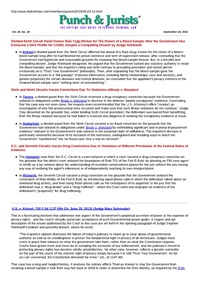The defendant in this case, Abel Tavera, was convicted by a jury of participating in a methamphetamine drug conspiracy; and he was sentenced to 186 months in prison. At the time of his arrest, Tavera was a passenger in a truck being driven from North Carolina to Tennessee by …
n its prior decision in this case, reported at U.S. v. Engelmann, 701 F.3d 874 (8th Cir. Dec. 19, 2012) (P&J, 02/04/13),a divided panel from the Eighth Circuit held that the district court had erred when it denied the defendant’s motion for a new trial based on a claim …
This is a fascinating decision that addresses one aspect of the Government’s perpetual accretion of power at the expense of privacy rights - and the courts’ virtually automatic acceptance of such Governmental power-grabs. A cogent and apt description of the issues addressed by the Court in this case are …
Jerome Hampton was convicted by a jury of a drug conspiracy in a case in which the Government’s evidence consisted largely of wiretap interceptions and recordings from a listening device. In fact, the Court emphasized that the prosecution “was unable to point to any money, drugs, weapons, or other …
This case is noted for its excellent and enlightening discussion of one of the most difficult to comprehend aspects of the use of “prior bad acts evidence” as set forth in Rule 404(b) of the Fed.R.Evid. - namely the fine line between evidence introduced to show “propensity” to commit …
From its outset, this case must have been a prosecutor’s fantasmagorical dream. As Judge McKeown described it, it was “a tax fraud case that was transformed into a trial on terrorism.” She also wrote:
“Th[is] appeal illustrates the fine line between the government's use of relevant evidence to document …
